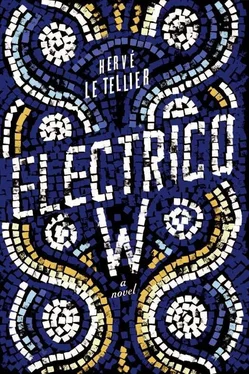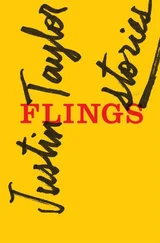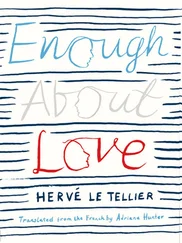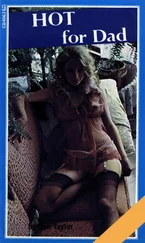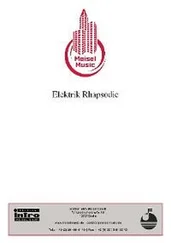Aurora headed straight off again toward Antonio while the last guests were leaving. Antonio whispered something to her and turned to me with the shifty, embarrassed eyes of a liar: “I’m going to stay a bit longer. I’ll be back later.”
I went home to the hotel, walking quickly, almost running. It was only when I reached Avenida da Liberdade that I slowed down. I took the photograph of Duck from my pocket and looked at her for a long time in the glow of neon lights. I tried to find a name for the feeling budding inside me, tenderness perhaps, the sort you would feel for a sister far away.
At that very moment Antonio was betraying Duck, and I resented him for it. He was probably betraying Irene first, but I was delighted by that particular felony. His distraction gave me strength. Soon, when Irene was there, he would be indebted to me for my silence.
I translated a few more Contos aquosos . I knew that, botched by my anger, they would need reworking later.
In the morning when the waiter brought up breakfast for two — we had adopted the habit of taking it in the large lounge — Antonio was not there. I waited until midday, in vain, and, as it was Sunday, I thought of Ruiz Custódia and the cemetery in the suburbs. So I decided the time had come to try my luck.

A cool breeze was blowing and I shivered in the shade of a cypress tree. Graves seen in sunshine are never entirely melancholy.
There’s always a hint of life to distract the eye, a blade of grass glimmering, a carefree chaffinch pecking at the ground, a black beetle with heavy mandibles crawling over the gravel. And when graves have no story to tell, we don’t linger over them.
A large weathered stone. Familia Custódia. Names, dates, and at the very bottom, Maria Custódia, 1934–1964. The gilding had long since disappeared, the northern corner of its almond green surface was decorated with a brooch of lichen. There was a bouquet of withered mauve flowers, and a slightly muddy, chipped, discolored porcelain plaque. It said TO MOMMY.
Thirty years old. How old would Duck have been? What sort of lies did they tell her that day? That her mother had gone to heaven?
When my mother died I was in London. For an interview, with the chairman of a chemicals company. Mom had gone to the hospital a few days earlier, she was frightened. The doctor took me to one side, shook my hand: “I’m very concerned. Don’t go too far from Paris.” But I never guessed it would happen so quickly.
I found out she had died when I returned to my hotel very late in the evening. The message left in my mailbox said: “Urgent: contacter le manager. Votre frère a phoné. Concerner votre mère.” Their use of French, even this approximate version, was thoughtful. I reread those words several times and went to sit near reception in an armchair that was a little too low for me. I wished I could feel something, feel the tears rising, but nothing came. I closed my eyes, tried to remember her face. I couldn’t.
Under my eyelids, red and crimson hydras, almost translucent creatures, reached out their supple tentacles. I discovered the existence of these luminous shapes in my teens, and they had become familiar. They weren’t the blotches of color that stay engraved on objects, phosphenes, as I discovered, much later, they were called. They were well and truly microorganisms with lives of their own, capricious undulating specks of life.
Every evening before I went to sleep, I liked to follow their aimless trajectories across what seemed to me to be a microscopic universe, a living primordial soup, a sort of original ocean. When I moved my eyes, the hydras followed the move for a moment, then stopped as if arrested in cloying jelly, before setting off again on their slow drifting. I concluded from this quirk that they were not the product of my imagination, and invented a serious illness for myself, an unknown infection involving giant bacteria. In the end I got used to them. I later learned they were caused by excess fluid in the vitreous humor, common in the shortsighted.
The night I lost my mother, the hydras were everywhere, more mobile than ever in the shifting liquid shadows. They made it impossible for me to reconstitute her features or even find a memory of her, they were protecting me from pain.
I remember the affectedly baleful expression on the hotel manager’s face when he came over to me, walking quickly, bending forward slightly.
“Monsieur Balmer?” he asked, speaking French with almost no accent. “Terrible news, monsieur. Your mother … Your brother called this afternoon. She has passed away. Please accept my condolences and those of the hotel staff.”
I returned to Paris on the first flight the following morning and took a taxi from the airport straight to the hospital. The driver wanted to chat — about the filthy weather, the staggered rail strike, the traffic — but I said, “I’m sorry, my mother died yesterday, I don’t feel like talking.”
My words were like a thunderbolt and he stopped talking immediately. There was something comical about this metamorphosis, and it produced the beginnings of a smile on my face. The driver caught sight of it in the rearview mirror, and I immediately resumed my orphan’s mask.
When I went into the room where my mother had been laid to rest, I didn’t recognize her. Her body looked tiny, with almost no depth to it, drowning in white sheets, like a pale skinny dwarf, a stranger’s corpse. Her mouth was open, gaping, as if she were asleep, knocked out by the smell of ether. Her dentures had been taken out, and, discomfited, I looked away from the obscene sight of this toothless old woman with her dry, twisted lips.
My brother Paul was there, along with my father, and they turned to look at me. Paul stood up, put his arms around me, and hugged me with calculated intensity, he was family but not affectionate. I wanted to hug my father but he was still sitting, had made no move toward me.
“I was in London,” I managed to say. “For work … I’m sorry.”
I had spent my whole childhood saying “I’m sorry.” Every time, my father would sigh and say, “Well, don’t let it happen again.” I wished he had scolded me that morning. He could have said, “You’ll never change,” or even, as he used to, simply sighed, “You may be sorry, Vincent, but don’t let it happen again.”
Yes, that’s what he could have said. But he stayed sitting and stared right at me. His eyes were red, but I knew he hadn’t cried all night, that he had just watched over her, unblinking.
He tilted his chin toward the bed. “It’s not me you need to apologize to.”
His voice was cold, his expression detached, hard, the sort I imagine people use on traitors and cowards, and I knew then and there that he didn’t forgive me, would never forgive me.
I heard a crunch of gravel.
An old man greeted me with a polite nod of his head. His Sunday best was outdated, but his tie neatly knotted, his white shirt ironed. He must once have been a strapping fellow, a force of nature, but he looked tired now. In fact, he wasn’t all that old. But he was unshaven or had shaved half-heartedly, and the wind was mussing his gray hair.
I stepped back, embarrassed, as if caught committing a crime as I meditated beside that strangers’ grave. I moved away to one side and pretended to pay my respects to another grave, the resting place of one Maule Gorma, funny, he was born the same year as me, 1944, and died in 1979. What do you die of at thirty-five? Then I walked toward the gates, slowly. There, sheltering behind a mausoleum, I waited for him.
Ruiz Custódia, if that’s who he was, didn’t seem to have noticed anything, or even to be surprised. He took the dead flowers from the grave, dusted it off a bit, and laid a branch of mimosa on it in silence. He scrunched up the paper it had been wrapped in and thrust this into his jacket pocket.
Читать дальше
